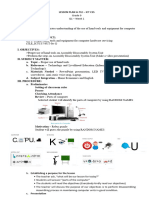script-for-essays
script-for-essays
Uploaded by
Priya singhCopyright:
Available Formats
script-for-essays
script-for-essays
Uploaded by
Priya singhCopyright
Available Formats
Share this document
Did you find this document useful?
Is this content inappropriate?
Copyright:
Available Formats
script-for-essays
script-for-essays
Uploaded by
Priya singhCopyright:
Available Formats
The Importance of Mental Health Awareness
In recent years, mental health has emerged as a critical topic of discussion in society. Despite
significant progress in understanding and addressing mental health issues, stigma and
misinformation still surround the subject, hindering many individuals from seeking help. Raising
awareness about mental health is essential for creating a supportive environment, promoting early
intervention, and ultimately enhancing the well-being of individuals and communities.
Breaking the Stigma
One of the most significant barriers to addressing mental health issues is the stigma attached to
them. People often feel embarrassed or ashamed to discuss their mental health struggles, fearing
judgment or discrimination. This stigma perpetuates silence and prevents individuals from seeking
help, worsening their conditions. By fostering open conversations about mental health, we can
normalize discussions about anxiety, depression, and other disorders, just as we do with physical
health issues. Education and awareness campaigns play a crucial role in dismantling these harmful
stereotypes and promoting acceptance.
Early Intervention and Prevention
Awareness is also vital for identifying and addressing mental health issues early. Many mental health
conditions develop during adolescence or young adulthood, but they often go unnoticed due to a
lack of understanding. When communities are educated about the signs and symptoms of mental
health challenges, individuals and their families can seek timely help. Early intervention not only
improves outcomes but can also prevent conditions from escalating into more severe forms, reducing
the overall burden on healthcare systems.
The Role of Schools and Workplaces
Schools and workplaces are important settings for promoting mental health awareness. Educational
institutions can integrate mental health education into their curriculums, teaching students about
emotional resilience and coping mechanisms. Similarly, workplaces can offer resources such as
counseling services, stress management workshops, and policies that prioritize employee well-being.
By fostering a culture of support and empathy, these environments can help individuals thrive both
personally and professionally.
Addressing Systemic Barriers
Beyond personal and community efforts, systemic barriers to mental health care must be addressed.
These include a lack of access to affordable treatment, insufficient mental health professionals, and
disparities in care for marginalized groups. Governments and organizations must prioritize funding
for mental health services and work toward equitable access. Technology can also play a
transformative role by providing telehealth options, making therapy and resources available to
people in remote or underserved areas.
You might also like
- Exploring Psychology Study Guide PDFDocument2 pagesExploring Psychology Study Guide PDFSean0% (1)
- How To Make A CakeDocument2 pagesHow To Make A CakeflorentinokobtmuaNo ratings yet
- MypdfDocument7 pagesMypdfsimonevoicoviciNo ratings yet
- The SignificanceDocument2 pagesThe Significanceshee fung foonNo ratings yet
- ESSAY3Document3 pagesESSAY3LIZANo ratings yet
- 36Document1 page36aishwaryapatilqsNo ratings yet
- The Importance of Mental Health AwarenessDocument2 pagesThe Importance of Mental Health Awarenessmondalbike830No ratings yet
- Importance of Mental Health AwarenessDocument2 pagesImportance of Mental Health Awarenesslolix61821No ratings yet
- The Significance of Mental Health AwarenessDocument2 pagesThe Significance of Mental Health AwarenesssimonevoicoviciNo ratings yet
- The Importance of Mental Health AwarenessDocument3 pagesThe Importance of Mental Health AwarenessazzxureNo ratings yet
- The Importance of Mental Health AwarenessDocument2 pagesThe Importance of Mental Health Awarenessabdelmajid.hamouti3No ratings yet
- Mental HealthDocument2 pagesMental HealthKaleNo ratings yet
- The Importance of Mental Health Awareness in Modern SocietyDocument2 pagesThe Importance of Mental Health Awareness in Modern Societyvipaj57276No ratings yet
- Essay On Mental Health AwarenessDocument2 pagesEssay On Mental Health AwarenesskaminachameleonNo ratings yet
- The Importance of Mental Health AwarenessDocument3 pagesThe Importance of Mental Health AwarenessceliadessardNo ratings yet
- The Importance of Mental Health AwarenessDocument2 pagesThe Importance of Mental Health Awareness6A DS //No ratings yet
- The Importance of Mental Health Awarenes1Document2 pagesThe Importance of Mental Health Awarenes1mondalbike830No ratings yet
- Mental Health AwarenessDocument2 pagesMental Health AwarenessCassidyNo ratings yet
- The Importance of Mental Health Awarenes2Document2 pagesThe Importance of Mental Health Awarenes2celiadessardNo ratings yet
- The Value of Mental Health AwarenessDocument1 pageThe Value of Mental Health AwarenessSiddhesh bakshiNo ratings yet
- Essay 20Document1 pageEssay 20laibakhanjan99No ratings yet
- The Importance of Mental Health AwarenessDocument2 pagesThe Importance of Mental Health AwarenessКалоян ПенчевNo ratings yet
- Essay 1Document1 pageEssay 1laibakhanjan99No ratings yet
- The Importance of Mental Health AwarenessDocument2 pagesThe Importance of Mental Health AwarenessКалоян ПенчевNo ratings yet
- Mental Health AwarenessDocument1 pageMental Health Awarenesspatelom.ravNo ratings yet
- The Importance of Mental Health Awarenes1Document2 pagesThe Importance of Mental Health Awarenes1celiadessardNo ratings yet
- Mental HealthDocument3 pagesMental HealthhasanollenNo ratings yet
- 1Document1 page1workr285No ratings yet
- The Importance of Mental Health Awareness in Modern SocietyDocument2 pagesThe Importance of Mental Health Awareness in Modern Societyerebong4193No ratings yet
- Mental Health SpeechDocument3 pagesMental Health SpeechJavion SappletonNo ratings yet
- Issue in Current SocietyDocument2 pagesIssue in Current SocietyRajasekar VNo ratings yet
- The Importance of Mental Helath AwarenessDocument4 pagesThe Importance of Mental Helath AwarenessJames BolchoverNo ratings yet
- Importance of Mental Health Awareness and SupportDocument1 pageImportance of Mental Health Awareness and SupportJorge UribeNo ratings yet
- ESAYDocument2 pagesESAYLIZANo ratings yet
- The Importance of Mental Health Awareness in Modern SocietyDocument2 pagesThe Importance of Mental Health Awareness in Modern SocietyMai Chí ThiệnNo ratings yet
- Investigacion 1718416447543Document5 pagesInvestigacion 1718416447543ayestasmichelleNo ratings yet
- The Significance of Mental Health AwarenessDocument2 pagesThe Significance of Mental Health Awarenessshin shin shinNo ratings yet
- Essay FreeDocument2 pagesEssay Freesegunmesele78No ratings yet
- Mental Health and The Stigma Surrounding ItDocument1 pageMental Health and The Stigma Surrounding ItKarina RevaladoNo ratings yet
- The Importance of Mental Health AwarenessDocument1 pageThe Importance of Mental Health AwarenessbarteksribdNo ratings yet
- Mental Health AwarenessDocument2 pagesMental Health Awarenessmsaqibqc6No ratings yet
- Mental Health and Societ Meenu WalterDocument7 pagesMental Health and Societ Meenu Waltervihaansingh323No ratings yet
- The Importance of Mental Health AwarenessDocument2 pagesThe Importance of Mental Health Awarenessbigun irinaNo ratings yet
- Dox 1Document1 pageDox 1m.ammarahmedabbasi26627No ratings yet
- 5Document3 pages5baochau19502No ratings yet
- The Importance of Mental Health Awareness in SchoolsDocument2 pagesThe Importance of Mental Health Awareness in Schoolspizzzza241104No ratings yet
- Breaking The StigmaDocument3 pagesBreaking The StigmachiboycleverNo ratings yet
- Mental Health Awareness and Strategies For Promoting Well-BeingDocument2 pagesMental Health Awareness and Strategies For Promoting Well-Beingnikhilsiddenki28No ratings yet
- Understanding Mental Health in The Modern WorldDocument2 pagesUnderstanding Mental Health in The Modern Worldahlai420No ratings yet
- UPLD - CGPT - The Importance of Mental Health AwarenessDocument1 pageUPLD - CGPT - The Importance of Mental Health AwarenessBeboy TorregosaNo ratings yet
- The Importance of Mental Health Awareness in SocietyDocument2 pagesThe Importance of Mental Health Awareness in SocietypeaceNIKNo ratings yet
- Twitter and FB As A Medium For Mental Health AwarenessDocument6 pagesTwitter and FB As A Medium For Mental Health AwarenessMary Grace LoyolaNo ratings yet
- Course Hero 1Document2 pagesCourse Hero 1volkangames6No ratings yet
- Document 3Document1 pageDocument 3aineeNo ratings yet
- ### The Significance of Mental HealDocument2 pages### The Significance of Mental Healjc1545313No ratings yet
- The Importance of Mental Health Awareness in Modern Society - BY - EMRALD FREE STUDY MATERIALSDocument3 pagesThe Importance of Mental Health Awareness in Modern Society - BY - EMRALD FREE STUDY MATERIALSssimplelineinmindNo ratings yet
- Destigmatization in Mental Health Final DraftDocument7 pagesDestigmatization in Mental Health Final Draftaminhabiba01No ratings yet
- Do Think Most People Realize How Common Mental Illness Is in The PopulationDocument3 pagesDo Think Most People Realize How Common Mental Illness Is in The PopulationHanna Marie TrocioNo ratings yet
- Mental HealthDocument4 pagesMental Health231810096No ratings yet
- Mental Health ContohDocument5 pagesMental Health Contohalicia heraNo ratings yet
- Breaking the Silence: Understanding and Addressing Mental Health Challenges in Black YouthFrom EverandBreaking the Silence: Understanding and Addressing Mental Health Challenges in Black YouthNo ratings yet
- RZL110Document2 pagesRZL110Jo MNo ratings yet
- Updated Agency ResourcesDocument15 pagesUpdated Agency ResourcesSenator Rand PaulNo ratings yet
- Week 8 ActivityDocument4 pagesWeek 8 ActivityEmmanuel SindolNo ratings yet
- PDF Corrected Draft Copy by Professor Dr. Dil Afroza BegumDocument11 pagesPDF Corrected Draft Copy by Professor Dr. Dil Afroza BegumOpu DebnathNo ratings yet
- Foreign Language InstituteDocument2 pagesForeign Language Institutedckapoorasfl9846No ratings yet
- Gaurav Pal ResumeDocument2 pagesGaurav Pal ResumePraveen KumarNo ratings yet
- Describe Polya - ppiSMp Sem2Document27 pagesDescribe Polya - ppiSMp Sem2sarafilza100% (3)
- Learning Activities: Activity 1. Directions: Answer The Following Questions Below: Write Your Answer Inside The BoxDocument3 pagesLearning Activities: Activity 1. Directions: Answer The Following Questions Below: Write Your Answer Inside The BoxJoyce Dela Rama JulianoNo ratings yet
- The Effects of Using Pictures On EFL Learners Vocabulary RetentionDocument14 pagesThe Effects of Using Pictures On EFL Learners Vocabulary RetentionPilar A. VegaNo ratings yet
- TataDocument45 pagesTataDeepak AnandNo ratings yet
- TRV Application Guide July2022Document8 pagesTRV Application Guide July2022Ned aaaNo ratings yet
- Sample Question PaperDocument10 pagesSample Question Paperatharvalamkane23No ratings yet
- Demo Lesson Plan in IcfDocument6 pagesDemo Lesson Plan in IcfNorlien DorliacNo ratings yet
- Das B M Soil Mechanics Laboratory ManualDocument165 pagesDas B M Soil Mechanics Laboratory ManualRajashekar.PNo ratings yet
- APA Style: Weinstein, C. S., & Mignano, A. (1993)Document11 pagesAPA Style: Weinstein, C. S., & Mignano, A. (1993)Kenny Cheah Soon LeeNo ratings yet
- Interior Health Medication Management AuditDocument46 pagesInterior Health Medication Management AuditJoe Fries100% (1)
- Syllabus POLS101 Wiener 2023Document6 pagesSyllabus POLS101 Wiener 2023garance0811No ratings yet
- Writing A Reaction PaperDocument18 pagesWriting A Reaction PaperLeidelen Muede MarananNo ratings yet
- Thinking Like A Lawyer PDFDocument23 pagesThinking Like A Lawyer PDFRod EllaineNo ratings yet
- Early & Middle ChildhoodDocument16 pagesEarly & Middle ChildhoodwintermaeNo ratings yet
- INTEGRATED SKILLS BY HARMER Plus Writing SkillDocument3 pagesINTEGRATED SKILLS BY HARMER Plus Writing SkillAsia Jaroszkiewicz100% (1)
- 4336 9035 1 SMDocument10 pages4336 9035 1 SMapi-553987808No ratings yet
- New Century Health Clinic - Chapter 4Document1 pageNew Century Health Clinic - Chapter 4Mario_Bros_GameNo ratings yet
- Outcomes - Based Teaching and Learning Plan in ME 107: Gov. Alfonso D. Tan CollegeDocument4 pagesOutcomes - Based Teaching and Learning Plan in ME 107: Gov. Alfonso D. Tan CollegePaulNo ratings yet
- Teachers Class Program-Grade 3Document3 pagesTeachers Class Program-Grade 3cindy dizonNo ratings yet
- Mod 1Document9 pagesMod 1Loy HermosoNo ratings yet
- Insular LifeDocument26 pagesInsular LifeJoyceNo ratings yet
- Well Being TelmosoDocument25 pagesWell Being TelmosoMaria Fe Antipuesto TelmosoNo ratings yet
- Reading 4.1. Orate PDFDocument5 pagesReading 4.1. Orate PDFRoberto PalmaNo ratings yet

























































































